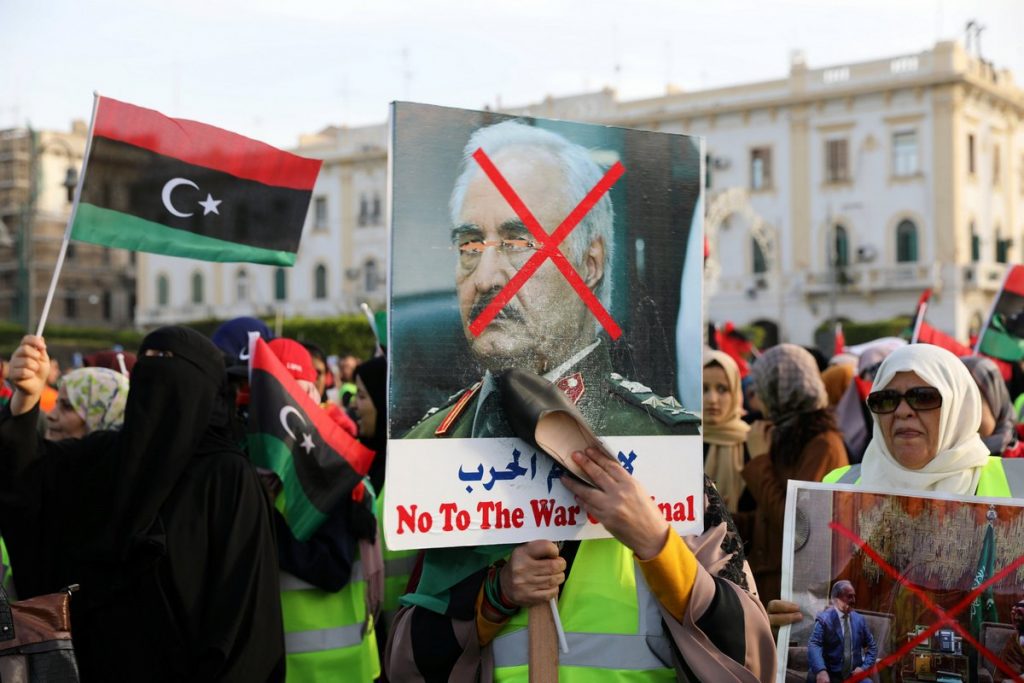Several airstrikes and explosions have reportedly shaken the Libyan capital of Tripoli as fierce fighting continues between Libya’s UN-backed government troops and forces loyal to renegade general Khalifa Haftar.
Reuters cited Tripoli residents as saying late Saturday that they had seen and heard aircraft opening fire and launching missile strikes on the capital city.
At least one missile struck a military camp of a force allied to Prime Minister Fayez al-Serraj’s Government of National Accord (GNA) in the capital’s southern al-Sabaa district, they said.
It was unclear if the strikes were conducted by a manned aircraft or a drone.
GNA’s military spokesman Colonel Mohammad Gnounou said at least seven airstrikes had been carried out earlier in the day against military positions held by forces loyal to Haftar’s Libyan National Army (LNA).
The strikes hit positions south of Gharian, 100 kilometers southwest of Tripoli, and also an airbase at al-Wotya, 50 kilometers further southwest.
Confirming the early Saturday attacks, the LNA claimed for its part that its forces were “taking control of several new positions on the frontlines in Tripoli,” and that its fighters had made Serraj’s troops retreat “on all fronts.”
“Our air force is providing fire support to troops on the ground,” said Ahmed al-Mesmari, spokesman for Haftar’s forces. “The enemy is trying to flank our forces from the back, but they have failed in the face of the strength of our fighters and the experience of our fighters. It’s become a war of attrition.”
The airport in Libya’s Tripoli reopens
The report of clashes came as Libyan authorities said they had reopened Mitiga Airport, Tripoli’s only functioning airport, after hours of closure due to possible airstrikes.
The Libyan capital has another airport, Tripoli International, which is currently closed.
Libya has been divided between two rival governments – the House of Representatives based in the eastern city of Tobruk and the GNA headed by Serraj in Tripoli.
The 75-year-old Haftar who enjoys the loyalty of a group of armed militia and backing from Saudi Arabia, the United Arab Emirates, and Egypt has taken upon himself to protect the government in Tobruk.
Armed forces and militia loyal to the GNA have been fighting back.
Haftar launched his deadly campaign on April 4 to invade and conquer Tripoli, the seat of the GNA, resulting in repeated fierce fighting on the southern edges of the capital.
According to the World Health Organization (WHO), the fighting has so far killed at least 205 people and wounded more than 900 others. The International Organization for Migration (IOM) also reported that more than 25,000 people have been displaced by the clashes.

The White House said on Friday that US President Donald Trump had personally discussed the situation in Tripoli with Haftar on the phone earlier this week.
The disclosure of the call prompted thousands of people in Tripoli to hold a protest against the US president.
Libya has been the scene of increasing violence since 2011 when former dictator Muammar Gaddafi was toppled from power after an uprising and a NATO military intervention.
His ouster created a huge power vacuum, leading to chaos and the emergence of numerous militant outfits, including the Daesh terrorist group.
 Alghadeer TV Alghadeer TV
Alghadeer TV Alghadeer TV
